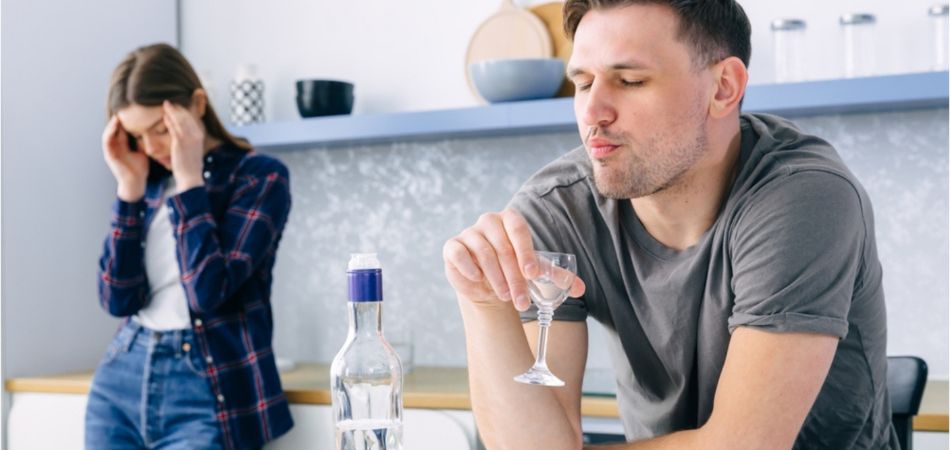Last Updated:
November 25th, 2025
How many people are affected by alcoholic partners?
Dealing with an addiction within the family is difficult, and living with a partner who struggles with alcohol is far more common than many people realise. Research from the Office for National Statistics shows that over half a million people in the UK are alcohol dependent. Yet, we know that alcoholism rarely ever only affects the individual with the addiction; instead, the effects ripple out into families and romantic relationships.
The numbers suggest tens of thousands of relationships are damaged by alcohol dependency, and despite carrying such a heavy toll, partners are often overlooked in support systems.
If you are a person struggling with an alcoholic partner, it might now always feel like help is available, but please remember, you are not alone in your suffering.

Warning signs your partner’s drinking has gone too far
In the earlier stages of a romantic relationship, it can be harder to recognise problematic drinking habits. Perhaps not enough time has elapsed for you to measure how different they are sober versus drunk. It can also be easier to observe signs if you’re living together, as hiding the effects of alcoholism is no longer an option.
If you think your spouse or significant other is struggling with alcohol, some of the signs of alcohol abuse to look for include:
- Physical changes you can’t ignore: A host of physical signs may show in your partner, such as weight fluctuations, frequent sickness, bloodshot eyes or shaky hands. Physical indicators suggest their body is under increasing strain from alcoholism.
- When alcohol takes priority over everything else: Aside from more overt physical signs, your partner can seem like they give drinking higher priority, especially over things you deem more important. They might skip family commitments or call in sick to work more often.
- New reasons, new excuses to drink: You might start noticing strange new times and reasons for your partner’s drinking. This can sometimes be thinly veiled in a playful joke, but this can be a sign of a more ominous loss of control.
- Hostility when sober, comfort only in alcohol: Whenever your partner attempts to cut back, they might start appearing more defensive or irritated. Some partners find that alcohol-free periods make their loved ones more restless or short-tempered, revealing how entrenched the relationship with alcohol has become.
Spotting signs early can be critical, as they don’t just highlight the toll alcohol is taking on your partner, but on the relationship as a whole. If you are noticing multiple, recurring signs, it may be time to force the matter and open the conversation on their drinking habits.
How can I open the conversation about their drinking?
You may feel very worried about starting “the talk” on your partner’s drinking, but remember that ignoring their problem will never solve it. You can think about opening the conversation in a way that avoids blaming and criticising, instead showing them what’s in your heart and letting them feel your genuine concern.
Some tips for guiding a conversation with sensitivity are:
- Stay calm and non-confrontational.
- Try to give specific help, like going with them to alcohol support groups.
- Use “I” statements to avoid sounding like you’re blaming them too much.
- Let them know specifically how their drinking affects you and others.
- Understand that there may be resistance.
What if my partner resists or lashes out?
No matter how much energy you pour into helping, your partner may still respond with anger or outright denial. As difficult as this is to face, it’s important to allow space for it.
Alcohol dependency often brings unpredictable shifts in behaviour. Their mood, energy, and willingness to engage may all become hurdles for you. If you’ve spoken openly and honestly about your concerns, you can take some comfort in knowing you’ve shown up with honesty and care.
From there, give them room to process. Let them know the conversation isn’t over, but also protect your own emotional well-being. Ultimately, their reaction, as well as their health, is not your burden to carry.
How can I protect my own well-being along the way?
Caring for a partner with alcoholism is draining, and it’s easy to lose sight of your own needs in the process. Yet, you must remember this: How can you look after them if you aren’t looking after yourself?
You will likely need to take active steps to safeguard your own well-being as you try to tackle alcoholism alongside your partner. This can include:
Where can I find support to help my addicted partner?
If you have a partner who is struggling with alcohol addiction, please remember that you don’t need to face this alone. Getting them started on the route to recovery might feel uncomfortable, but it could be the turning point that saves the relationship.
At Recovery Lighthouse, we specialise in alcohol detox treatment that helps ease any withdrawal symptoms. We used evidence-based therapies to address and reframe the drivers of addictive behaviours. Aftercare services are in place to keep a person supported for sustained, lifelong recovery.
Don’t wait until alcoholism embeds itself deeper. Contact us today to take that first step to the kind of future you want: healthier, sober, and free from the grip of addiction.


